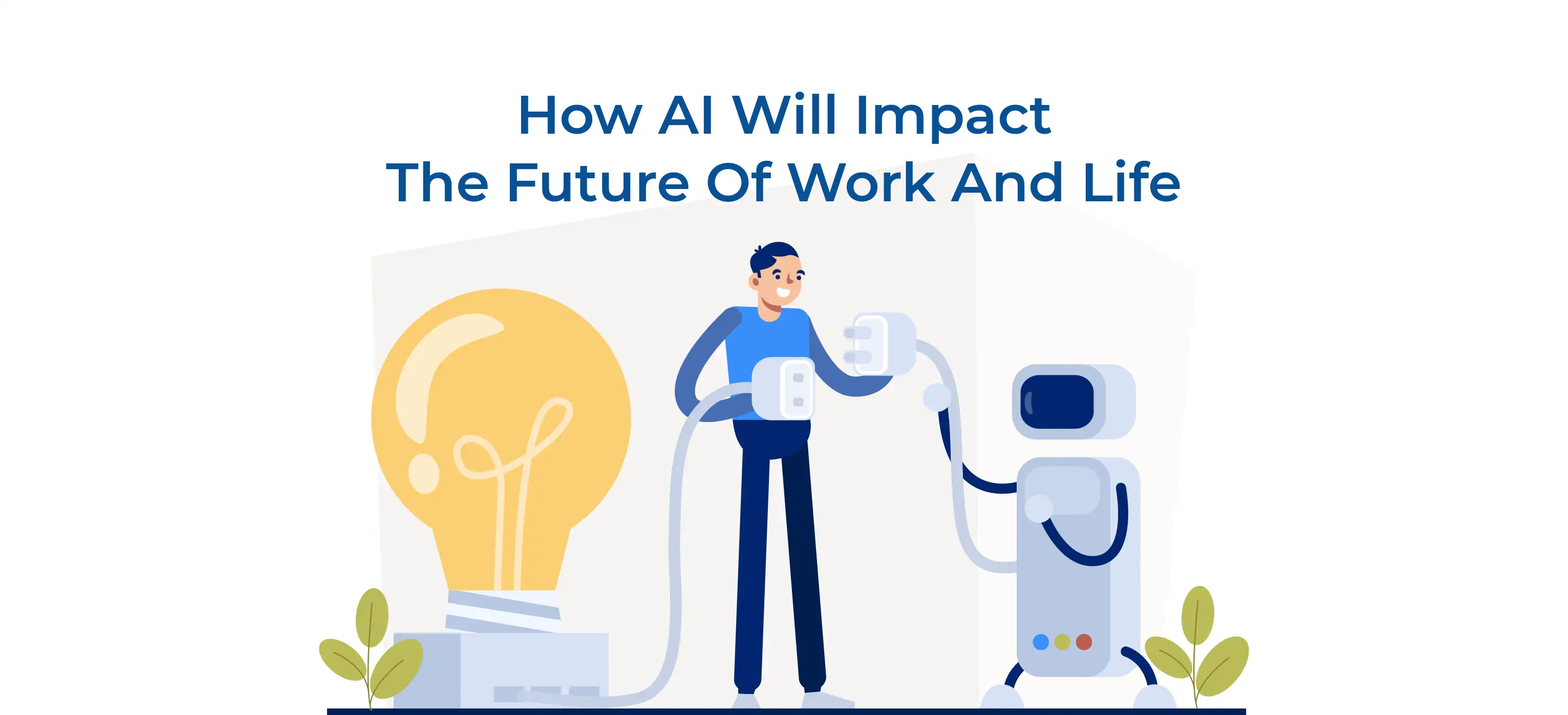 Jothi Kumar
Dec 05, 2024
Jothi Kumar
Dec 05, 2024

Artificial Intelligence has become a game-changing power, completely transforming numerous facets of our existence. Its rapid development and integration into different sectors are reshaping the future of work and life as we know it. From automated processes to personalized experiences, AI disrupts and enhances traditional systems.
Artificial intelligence (AI) and models like ChatGPT will continue to significantly impact the future of work and life in several ways: This blog will explore the profound impact of AI on the future, examining its implications in the workplace and everyday life while also addressing the ethical considerations that arise.
As AI advances, its impact on the workplace becomes increasingly significant. Two key aspects of this impact are automation and augmentation. Automation can potentially displace jobs, while augmentation aims to enhance human capabilities with AI assistance. Additionally, changing skill requirements necessitate continuous learning and adaptation.
AI automation has already impacted jobs like assembly line workers and data entry professionals. Future advancements may lead to job losses in customer service and transportation. The job market demands skills in data analysis, programming, and problem-solving, highlighting the need for upskilling and reskilling. AI serves as a tool to enhance productivity and efficiency, enabling professionals in healthcare, finance, and creative fields to focus on higher-level tasks.
Check Out: What is Generative AI And How Does it Work
AI is not limited to the workplace; its influence extends to our daily lives, transforming how we interact with technology, access information, and experience various services. From personalized recommendations to advancements in healthcare and smart cities, AI is reshaping the fabric of our everyday existence.
AI's integration into everyday life offers numerous benefits, making our experiences more tailored, convenient, and efficient. However, ethical considerations must be addressed to ensure responsible AI usage.
Check out: Will Artificial Intelligence Take Over Human Jobs by 2030?
Addressing the ethical implications is crucial as AI becomes increasingly integrated into our lives. Three key areas of concern include privacy and data security, bias and fairness, and the impact of AI on the job market and income inequality.
The extensive use of AI relies on vast amounts of personal data, raising concerns about privacy and data protection. Safeguarding individuals' information from unauthorized access and ensuring responsible data handling practices are essential to maintain trust and prevent misuse.
The increasing automation brought about by AI has the potential to disrupt the job market, leading to job displacement and income disparities. It is essential to develop strategies to mitigate these effects, such as investing in education and retraining programs to equip individuals with the skills necessary to adapt to the changing workforce.
Check out: Jobs Most at Risk of Being Replaced by AI
Collaboration between humans and AI is crucial to harness the full potential of AI and ensure a better future. Rather than viewing AI as a threat, we should embrace it as a tool that complements and enhances human capabilities. This collaboration holds immense benefits and opens up new possibilities across various domains.
Combining human ingenuity and AI's computational power in collaborative efforts leads to superior outcomes. Augmented intelligence emphasizes the synergy between human intelligence and AI capabilities, leveraging AI's speed, accuracy, and data processing alongside human intuition, creativity, and ethical judgment.
Human-AI collaboration drives advancements across fields. In healthcare, doctors can use AI to make accurate diagnoses while providing personalized patient care. In creative industries, AI aids artists in generating ideas and streamlining repetitive tasks. In business, AI analyzes market trends, informing decision-making, while human managers provide strategic vision.
Ethical considerations in AI's development and use are crucial. Transparent and accountable AI algorithms minimize biases and discrimination. Regulations and guidelines are necessary to protect privacy and prevent misuse of personal data. Collaboration among governments, experts, and developers establishes ethical standards and ensures responsible AI practices.
Check out: How Chatgpt Is Changing The Job Market?
As AI advances, its impact on the future of work and life becomes increasingly apparent. Embracing AI as a collaborative tool holds immense potential for driving innovation, enhancing productivity, and addressing complex challenges. However, ethical considerations must guide its development and use to protect privacy, ensure fairness, and minimize negative impacts on the job market and income inequality. By navigating the ethical landscape of AI responsibly, we can shape a future where AI augments human capabilities and leads to a better society for all.
Read Also : AI Skills Surge in Africa and What It Means for Your Career
Here is the list of other major locations where Edoxi offers Artificial Intelligence Course
Artificial Intelligence Course in Dubai | Artificial Intelligence Course in Qatar

Software and IT Trainer
Jothi is a Microsoft-certified technology specialist with more than 12 years of experience in software development for a broad range of industry applications. She has incomparable prowess in a vast grouping of software development tools like Microsoft Visual Basic, C#, .NET, SQL, XML, HTML, Core Java and Python.
Jothi has a keen eye for UNIX/LINUX-based technologies which form the backbone of all the free and open-source software movement. As a Big data expert, Jothi has experience using several components of the Hadoop ecosystem, including Hadoop Map Reduce, HDFS, HIVE, PIG, and HBase. She is well-versed in the latest technologies of information technology such as Data Analytics, Data Science and Machine Learning.